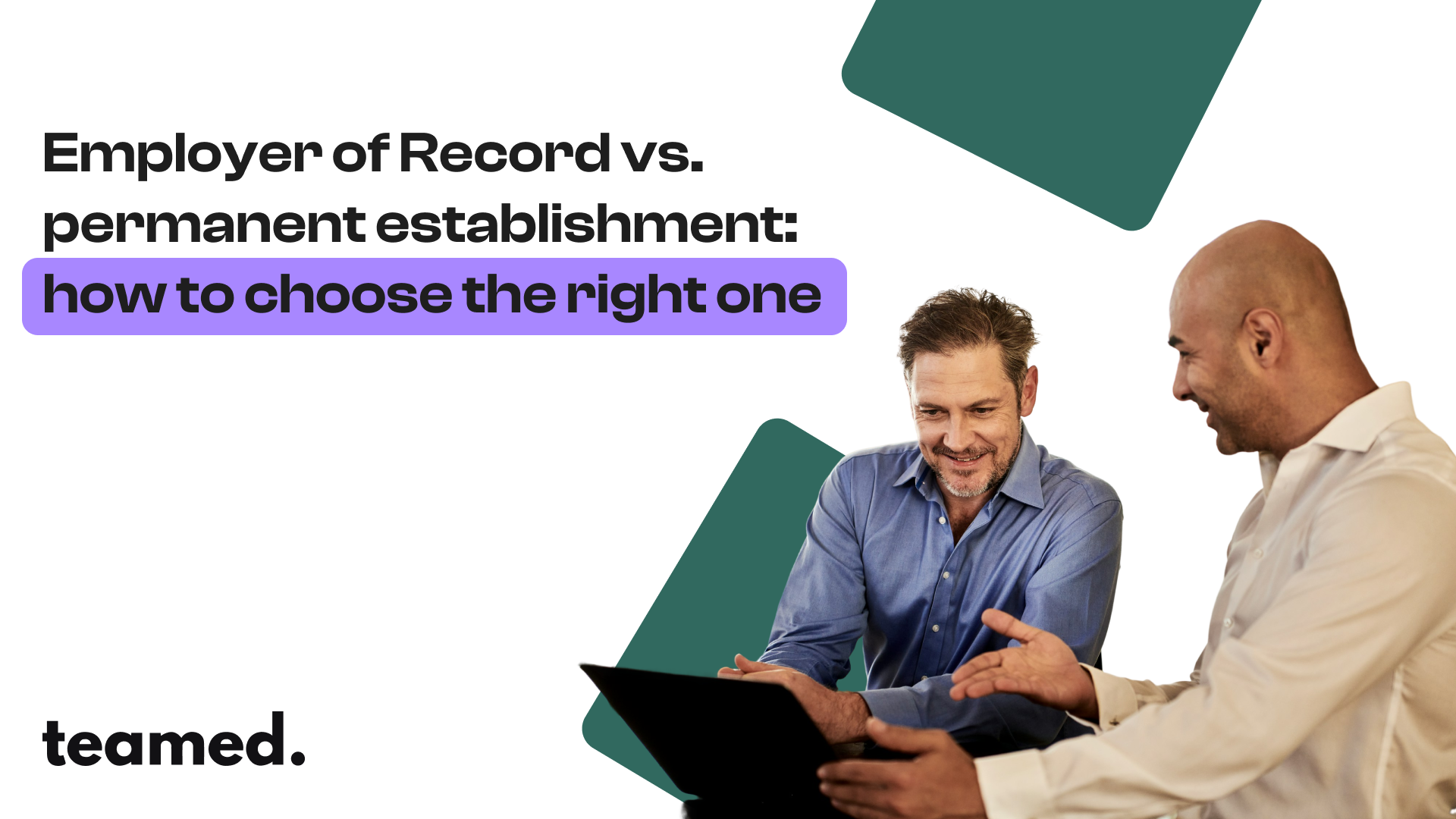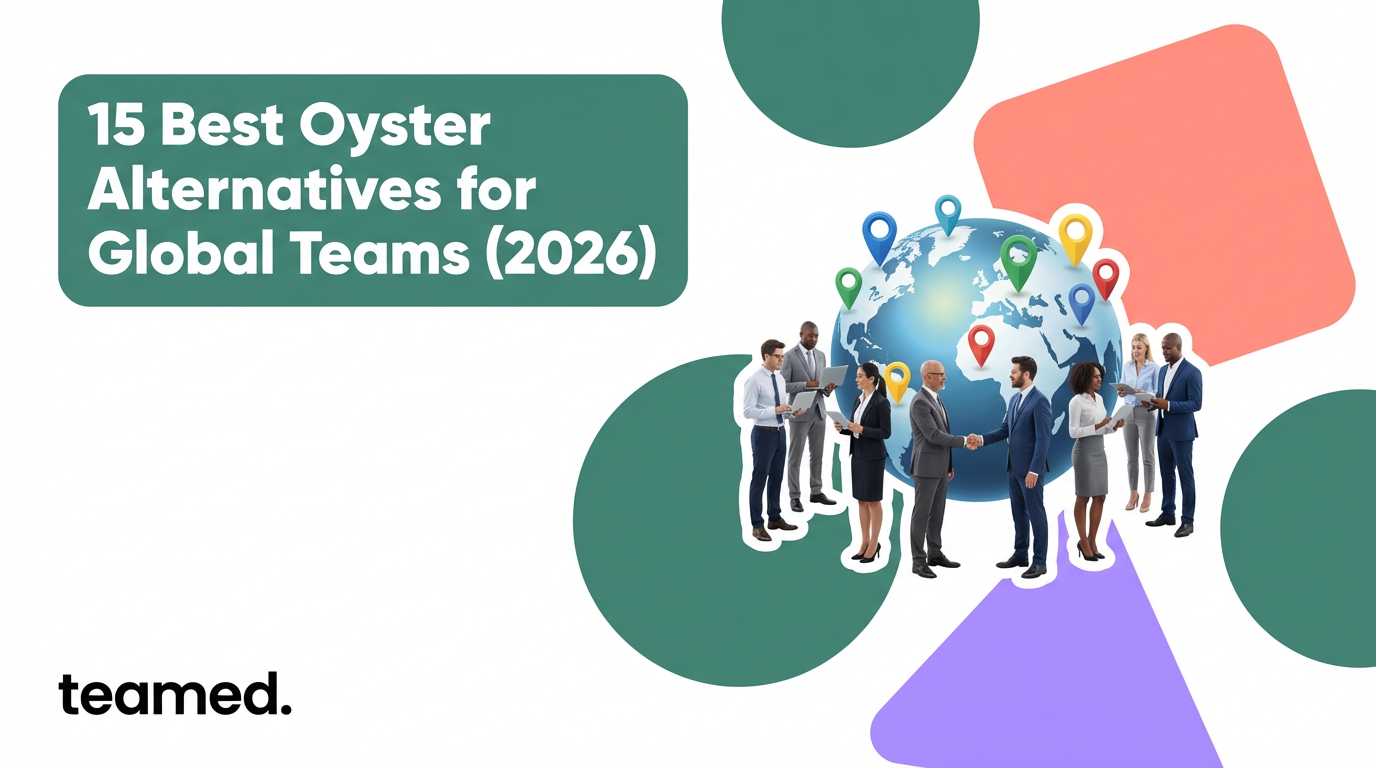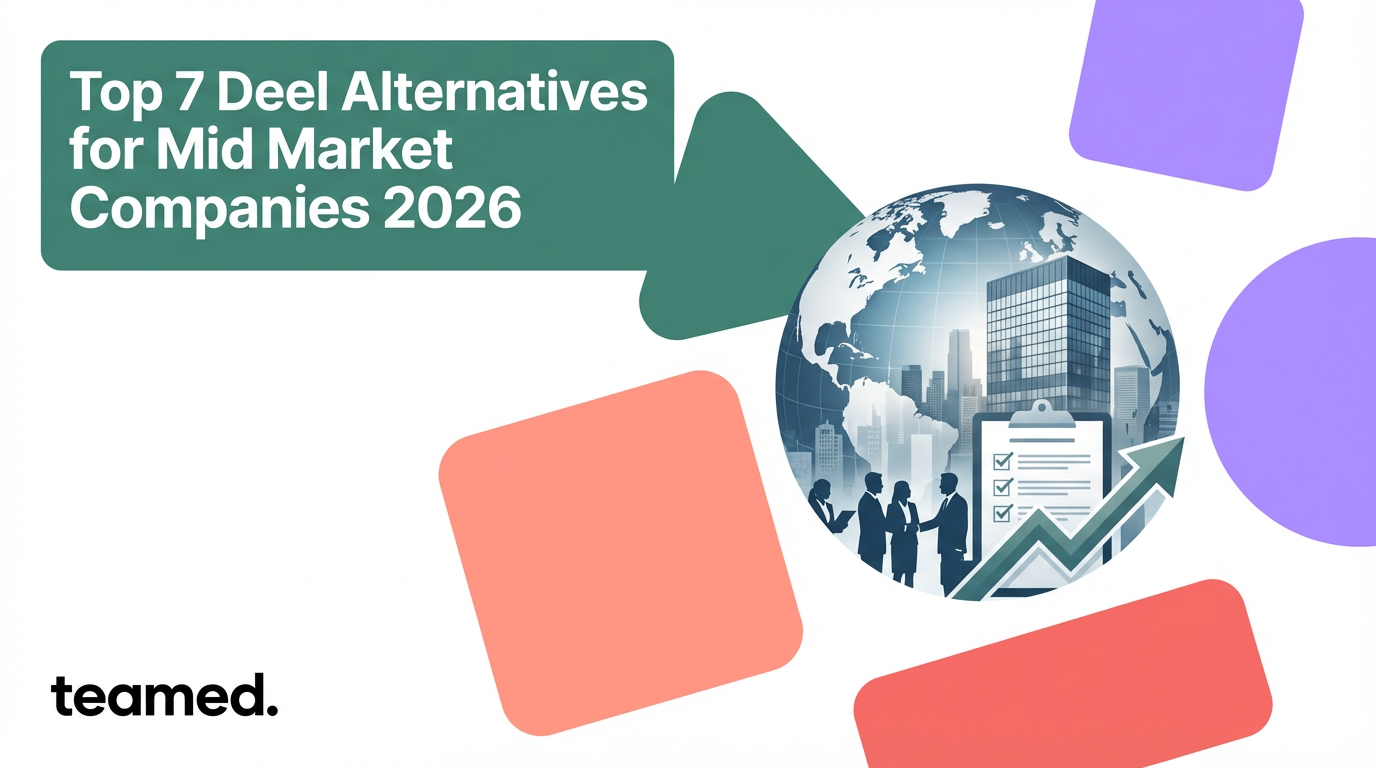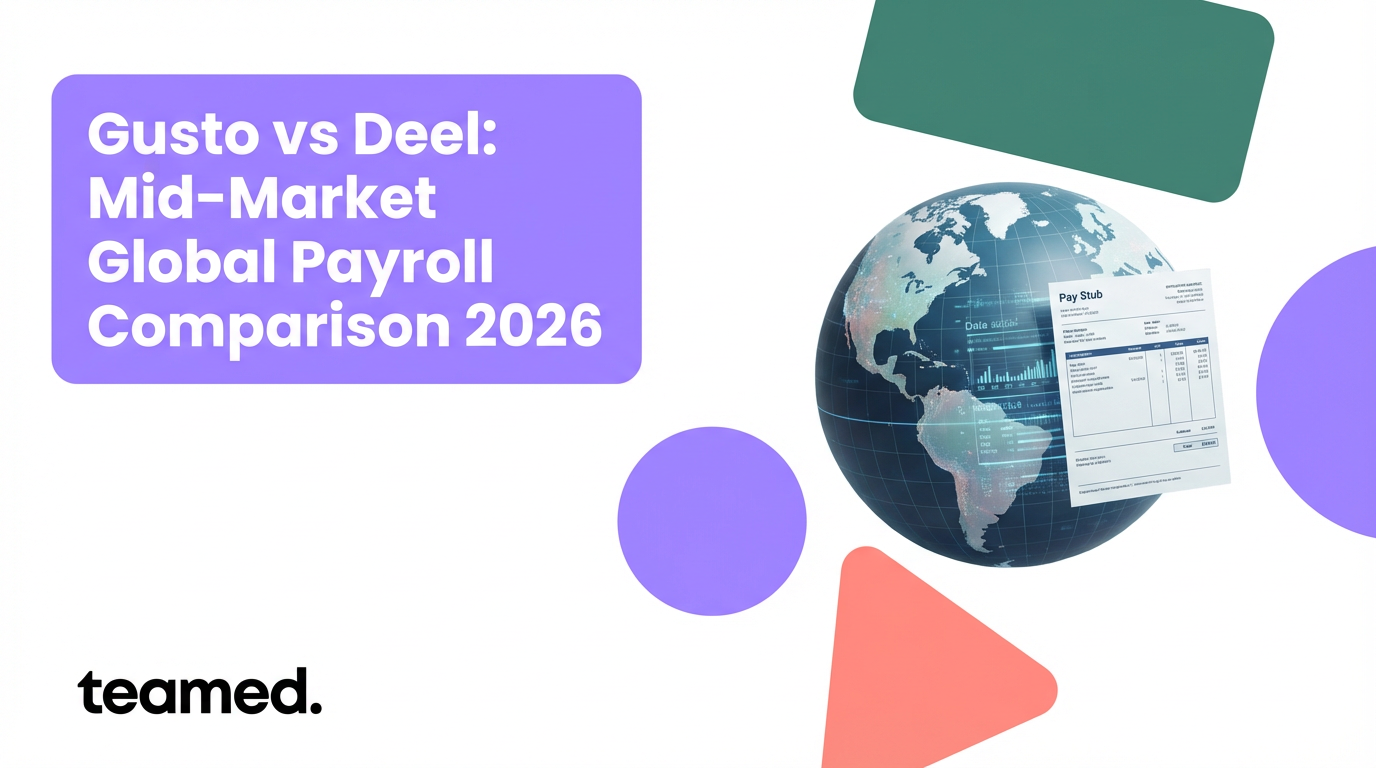Key takeaways: EOR vs. entity
- Hiring abroad means playing by local rules, from UK pensions to payroll taxes in Singapore. Getting it wrong risks fines, lawsuits, and unhappy employees.
- Setting up a legal entity to create a permanent establishment can take months. An EOR lets you hire in days, so you don’t lose top talent or stall growth.
- Each market has its own timelines, systems, and requirements. Without a partner, you’ll spend more time on admin than strategy.
- From honest pricing to 24/5 expert help, Teamed makes sure every employee feels supported and valued.
What is an Employer of Record (EOR) vs. a permanent establishment (PE)?
An Employer of Record (EOR) is a third-party company that legally hires employees for you in a foreign country. A permanent establishment (PE) is when your business sets up a formal, taxable presence in that country.
Note: PE is a tax concept indicating a business’s taxable presence. A legal entity is the structure you set up in a country. Most, but not all, PEs require a full entity, for instance, a dependent agent signing contracts.
While you still run the day-to-day, an EOR like Teamed deals with all local HR, payroll, and compliance:
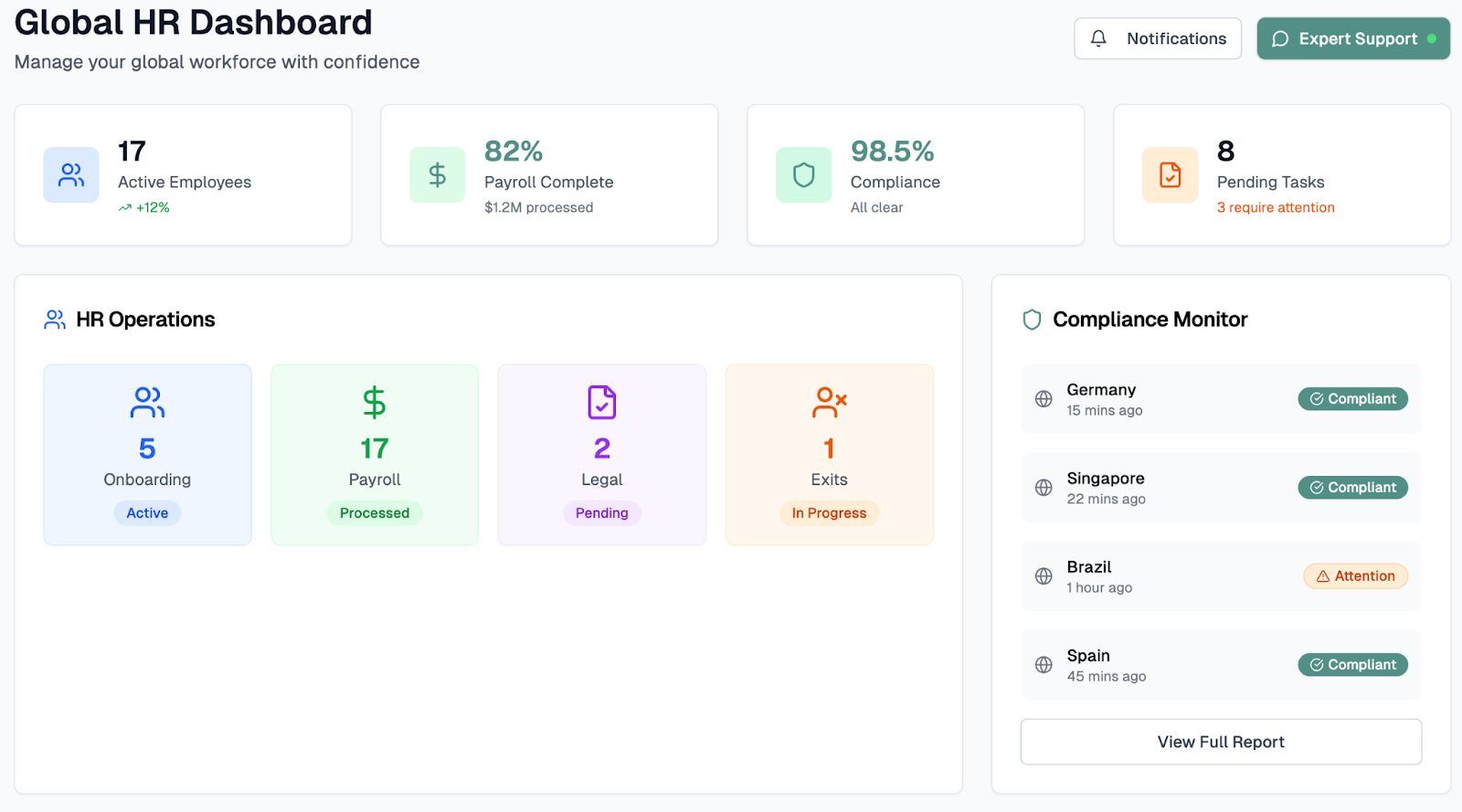
On the other hand, a PE is a fixed place of business, an office, branch, or subsidiary you fully own in a host country.
Here, you’re on the hook for all employment processes, payments, and every other business activity that comes with running a company there.
An EOR arrangement may reduce the likelihood of creating a permanent establishment, but it does not guarantee avoidance of PE risk. PE status depends on the specific facts, activities, and local tax authority interpretations.
The right choice usually comes down to speed, budget, and how much control you want. And it’s becoming a bigger consideration for 47% of employers who want to tap into more diverse talent pools.
Imagine you’re running a UK software company and you’ve found the perfect sales rep in Germany.
With an EOR, you send over an agreement today. By next week, they’re legally employed in Germany, paid on time, and fully compliant with local laws.
Go the PE route, and the story looks very different.
First, you register a German entity. Then, you open a local bank account, find an accountant, set up payroll, register for taxes, and keep up with every single employment rule and deadline. (Cue late-night “What’s a Betriebsnummer?” Googling.)
Months go by before your new hire can even start.
A good EOR is like having a local HR, finance, and compliance team rolled into one. It’ll streamline:
- International onboarding and local employment contracts
- Payroll processing and salary payments
- Local tax deductions and filings
- Statutory benefits and insurance
- Labour laws, holiday adherence, and employee support (e.g., visa guidance or reimbursements)
- Offboarding and termination processes
EORs are easier ways to hire and pay people abroad without getting tangled in legal red tape or creating permanent entities before you’re ready.
👉 To learn more about how an EOR works, check out our article: What is an EOR?
What are the benefits of global hiring through an EOR vs. legal entities?
An EOR is quick to set up, doesn’t tie you down long-term, and keeps costs lighter .
Setting up a PE gives you more control and a stronger local presence. But it comes with in-depth setup and costs, slowing ramp-up to a crawl.
Here’s how the main benefits stack up for international hiring :
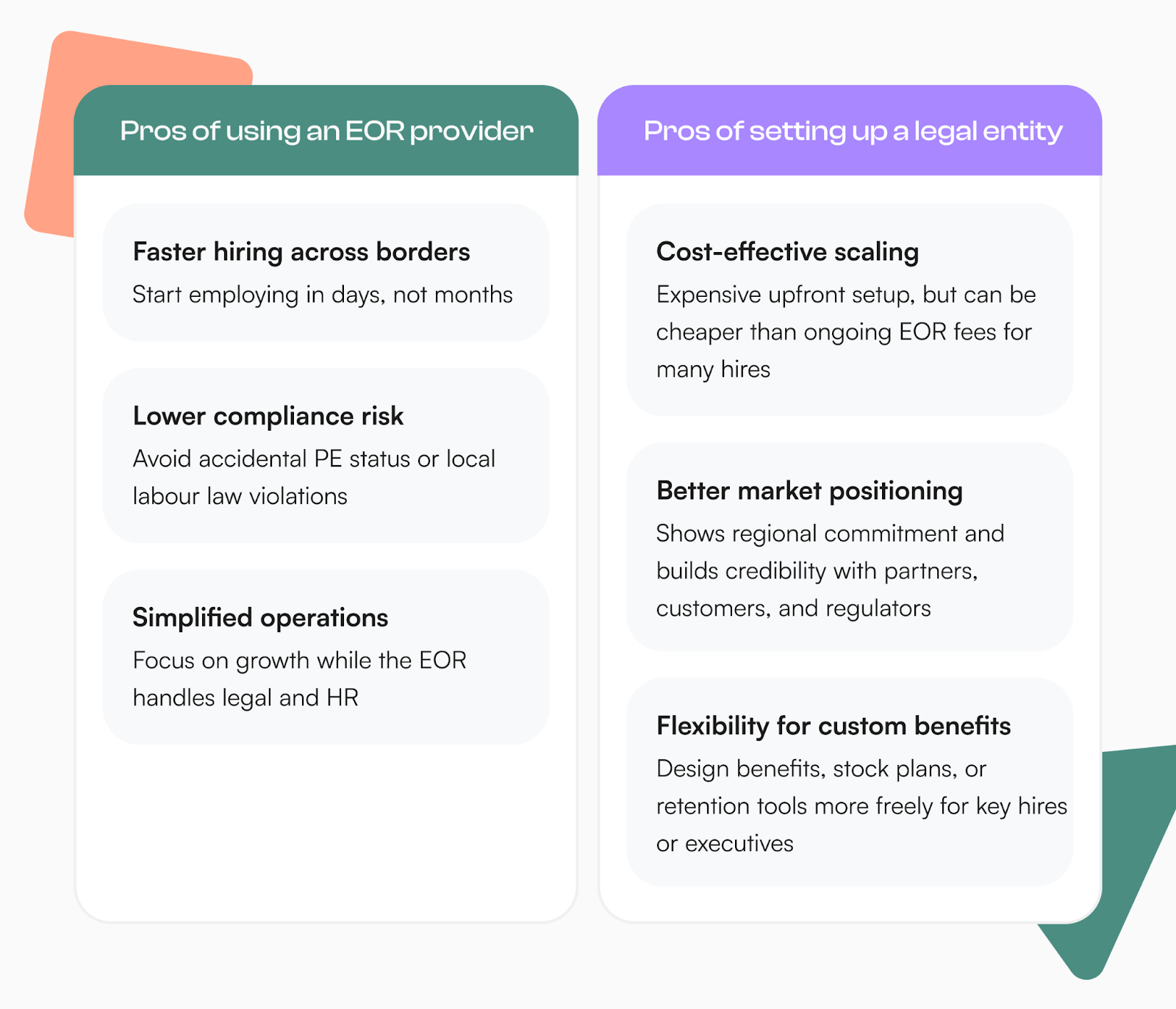
According to McKinsey research, successful European hiring only happens around 46% of the time. That shows just how tricky navigating local rules and processes can be.
Add 38 days to fill the average role, and you see the problem: mid-sized businesses need to grow faster without getting bogged down in bureaucracy.
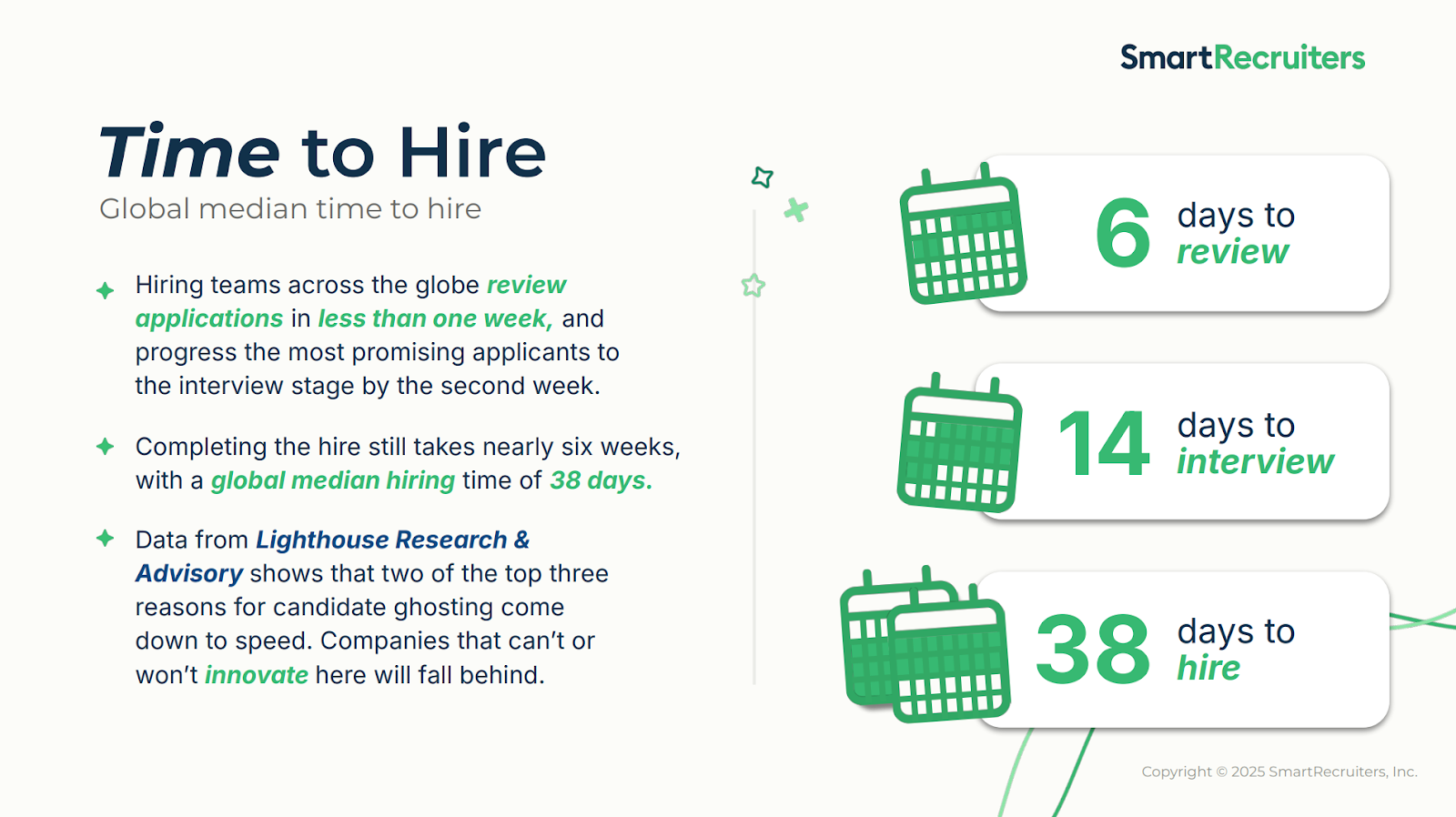
But global expansion doesn’t have to mean paperwork nightmares or months of delays.
EOR services remove the roadblocks. You can hire fully compliant local talent in days, while the third-party company handles everything from contracts to payroll.
EORs can offer a faster and potentially lower-risk alternative to entity setup in many cases, but this is not universally true and depends on the specific country and business activities.
Legal entities are a better fit when you’re ready for long-term investment or a physical presence in a specific market.
👉 Use our employment calculator to compare hiring costs across countries in seconds
4 permanent establishment risks and how the right EOR solves them
Global employment comes with many opportunities, but also a few hidden traps. One of the biggest? PE risks.
Unexpected bills from local tax authorities, compliance challenges , and operational miscommunications can catch mid-sized businesses off guard.
Here are four of the most common risks and how an EOR arrangement helps.
Note: An EOR greatly reduces the risk of creating a PE, but can’t erase it entirely. If your parent company is signing contracts or generating revenue locally, tax authorities may still view you as having a presence there.
Risk #1: Hidden tax exposure and penalties
Hiring someone locally can accidentally trigger permanent establishment (PE) rules, meaning your company suddenly owes corporate taxes you weren’t expecting.
How an EOR solves this: By being the legal employer on paper, an EOR manages all international employee finances and stays on top of tax liability.
For mid-sized businesses, one unexpected tax notice can tie up resources and distract leadership. All while your team is trying to scale internationally.
Let’s say your US-based marketing firm hires a remote designer in France.
Suddenly, your company faces double taxation, fines, and paperwork, derailing growth plans.
With an EOR, the local provider legally employs the designer. This setup shields your business by:
- Handling local payroll, social contributions, and benefits correctly
- Reducing the risk of triggering PE status and unexpected corporate income tax liabilities, in the new country
- Adhering to local laws with financial reporting and filings
- Protecting you from unexpected fines, penalties, and audits
The result? You avoid frantic calls to accountants and scale into France knowing you’re compliant from day one.
👉 Example in action: Learn how Web3 company Luganodes increased its global workforce by over 50% with no drama in a highly regulated industry.
Risk #2: Compliance gaps with local labour laws
Hiring abroad means navigating each country’s specific employment rules. Contracts, holidays, benefits, termination, every region plays by its own rulebook.
Mess up by misclassifying a Brazilian employee, or skip mandatory UK pension contributions?
You’ll find yourself staring down lawsuits, fines, or even a ban on doing business locally. Basically, it’s the HR version of stepping on a legal landmine.
How an EOR solves this: A good EOR ensures contracts, payroll, and benefits are fully compliant with country-specific laws. Plus, it keeps up with changes so you don’t have to.
Take Singapore, for example. You hire a customer success manager there, slap together an English contract with at-will termination (very US-style), and think you’re set.
A few months later, you discover Singapore requires specific notice periods, Central Provident Fund (CPF) contributions, and mandatory annual leave.
Suddenly, you’re facing back payments, potential penalties, and one very unhappy employee.
With an EOR, that hire is compliant from day one. The third-party company:
- Structures agreements to reflect Singaporean employment laws
- Manages the entire employment relationship (including CPF and payroll deductions) properly
- Stays current on changing regulations so you stay out of legal hot water
You build a stronger relationship with your new employee from the get-go, while you scale without worrying that your contracts and benefits will come back to bite you later.
👉 Example in action: Learn how property management company City Relay expanded its global team by 80% with Teamed’s in-country experts handling local labour laws.
Risk #3: Slow and costly market entry
Setting up a foreign entity isn’t a quick win. It takes months of navigating registrations, banking, legal, and accounting requirements before you can even post the job ad.
For a growing business, those delays stall projects and frustrate teams waiting on reinforcements .
Meanwhile, that dream hire you set your heart on might already be working for a competitor.
How an EOR solves this: An EOR is already established in the country and can employ people on your behalf almost immediately. Instead of waiting on red tape, you hire talent in days.
Take a Canadian fintech company eager to expand into Japan.
It identifies a brilliant local product manager but quickly realises that establishing a Japanese entity could take 6–9 months. Not to mention ongoing legal retainers and accounting fees.
An EOR hires the PM within a week, pays her locally, and covers the right benefits .
Testing in the Japanese market starts right away without sky-high setup costs or sacrificing speed.
👉 Example in action: Learn how boutique recruitment firm Data Science Talent hired in South Africa in 13 days with zero compliance issues.
Risk #4: Scaling complexity across countries
Managing multiple legal entities can quickly become a logistical nightmare. Especially when each country has its own payroll calendars, reporting standards, and compliance requirements.
Instead of focusing on strategy, leadership becomes the world’s most expensive admin team.
How an EOR solves this: Instead of building a patchwork of entities and advisors, one partner manages a streamlined process across every market.
Imagine a fast-growing SaaS company scaling into Hong Kong, Brazil, and Spain.
Each country has its own reporting requirements, legal holidays, and benefits structures. Coordinating this internally drains bandwidth and creates room for error.
With an EOR, the SaaS team can hire employees in all three countries using one contract and a centralised dashboard.
Without one, the same company would have to:
- Set up a separate entity in each country (complete with lawyers, accountants, and a small army of payroll providers)
- Manage conflicting timelines, languages, and compliance rules across different systems
The difference is night and day.
One path feels like scaling. The other feels like babysitting a never-ending trail of spreadsheets in multiple languages.
👉 Learn how to navigate EU employment compliance as a scaling business in our handy guide.
When to choose an EOR or foreign legal entity: key considerations and a simple comparison
The choice between an EOR or a foreign legal entity depends on where you are in your growth journey, how many hires you’re planning, and whether you’re testing or committing to a market.
Most companies work through the decision in three steps:
- Strategic goals. Why are you hiring here? If it’s to test a market or move fast, an EOR usually makes sense. A local entity may be the better fit if you’re anchoring long-term.
- Cost curve. How many people will you hire? At smaller headcounts, an EOR is usually more cost-effective. Once you reach 15–20+ employees in one country, entity setup and running costs often work out cheaper per employee.
- Risk appetite. How much compliance and payroll complexity do you want to handle yourself? A low appetite for risk points toward an EOR, while a higher appetite (and in-house HR/legal capacity) makes an entity more viable. practical HR questions :
Layer those decisive steps with a few
- Are you hiring in one country or spreading out across several?
- Is this a short-term test or a long-term expansion?
- How many people will you hire per region?
- Do you need flexibility now or deeper local later?
Your answers help map your growth strategy to the right approach, whether that’s the flexibility of an EOR or the long-term control of a local entity.
To make your decision less abstract, here’s a quick side-by-side comparison of common scenarios and the best hiring setup in each case:
According to Kantata research, 53% of senior execs struggle with hiring full-time employees, and 61% spend a third of their days dealing with turnover problems.
Before expanding globally, you need to streamline how you hire, support, and retain talent. Otherwise, you’ll just be multiplying problems across borders.
An EOR can help with that. But here’s the thing: not all are created equal.
Others stop at payroll. Teamed brings it all together, one platform for every worker type, powered by AI for speed and guided by people for judgment.
The result? Fair, transparent pricing with no surprises, and expert support through every stage of employment.
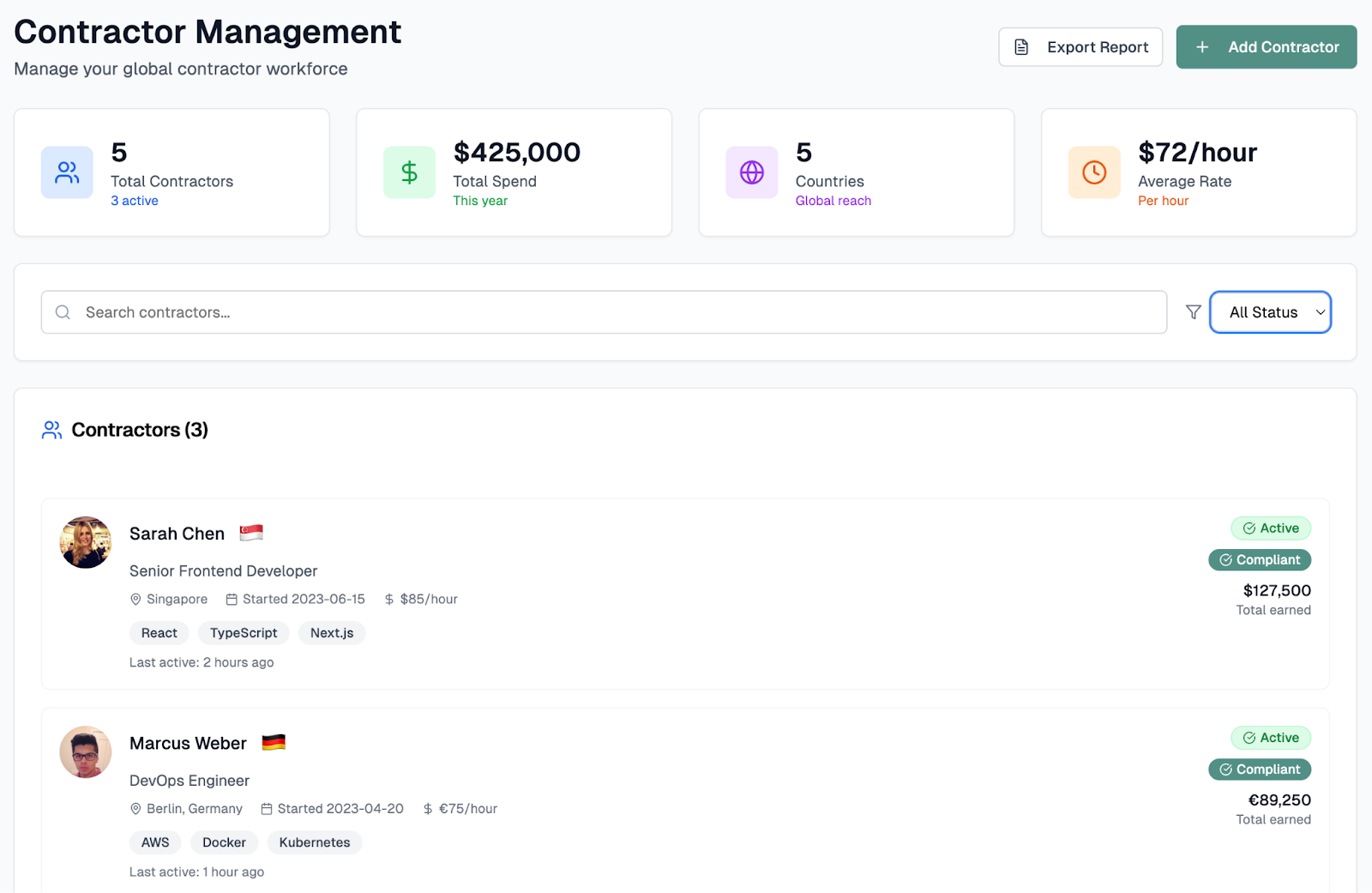
More on that in the next section.
Take a Portugal-based accounting platform that wants to hire two customer support reps in the Philippines to test out a 24/7 model. An EOR is the fastest , lowest-risk path.
But if the same business later decides to build a 60-person engineering hub in India ?
Setting up an entity makes more financial sense and signals a long-term commitment to the region.
👉 Learn what to consider before choosing an EOR partner in this snappy guide.
Don’t forget to talk to multiple EOR providers before committing
Some EORs are great at payroll but vanish when things go sideways. Others promise full-service support but hit you with confusing pricing and hidden fees.
Almost half (46%) of small business leaders say operational inefficiencies are one of their biggest challenges.
But don’t go leaping into a contract with any old software that promises the world before thoroughly assessing it .
Compliance, technology, customer support, these can vary wildly. So, it pays to be totally sure of what you’re getting before signing anything.
For example, Teamed isn’t just another EOR. We’re there for the good times and the messy times, from onboarding and growth to exits, disputes, and audits.
The supposedly “Deel-uxe” providers push those moments into bots, rigid workflows, or buried small print. We don’t.
You get real experts on the line 24/5, people who know global hiring inside out.
The result: clear answers, flexibility when you need it, and fair, transparent pricing that doesn’t shift when the pressure’s on.
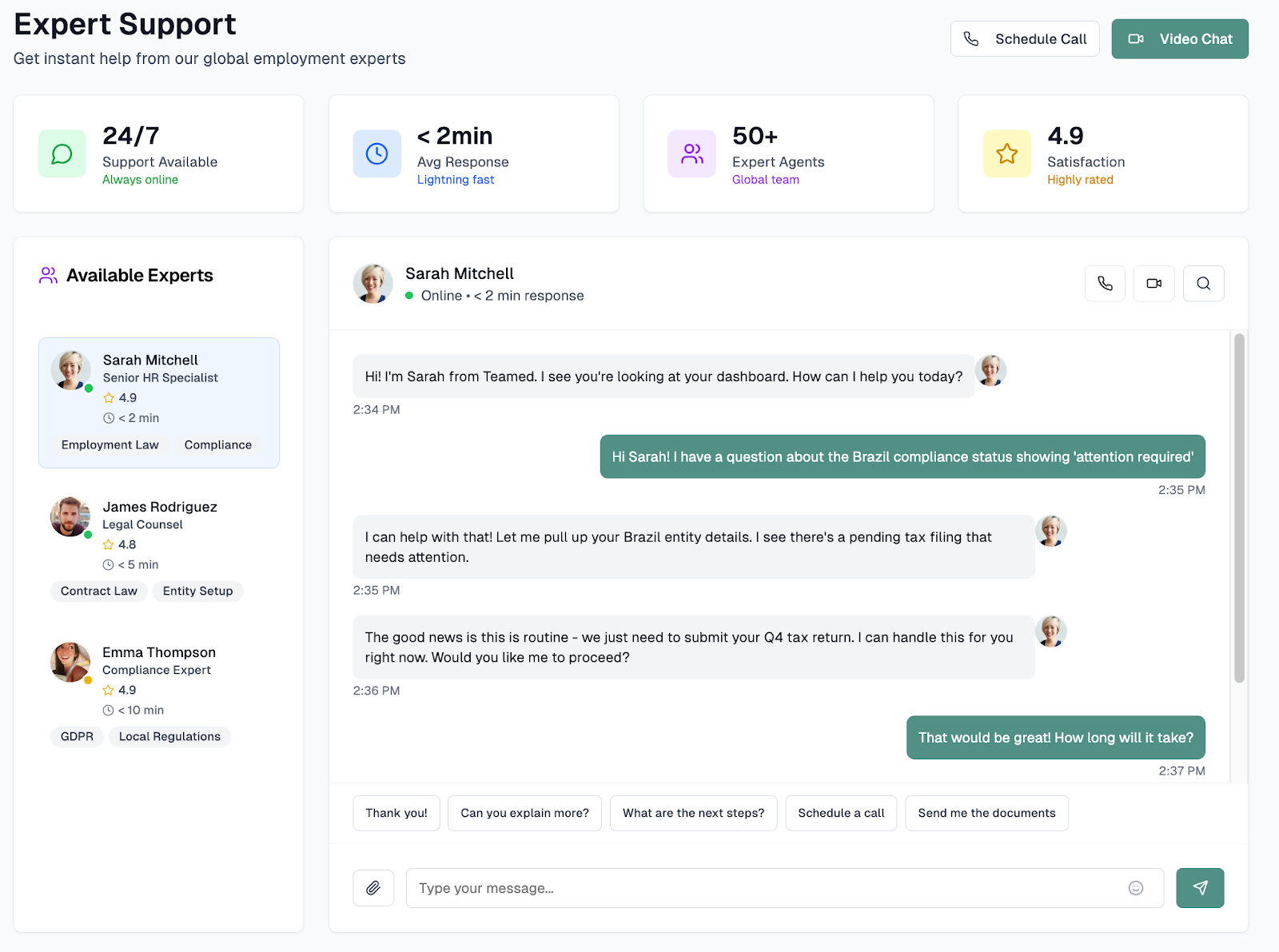
We want to grow with you at every stage. And we strive to ensure remote workers feel just as valued as your home-country team members.
Here’s what makes Teamed different:
- Compliance you can trust. We handle local laws, taxes, and benefits in 180+ countries, so you don’t have to worry about penalties or fines.
- Rapid onboarding. Save 30+ hours per hire and get new team members up and running in 24 hours or less, with tailored benefits packages.
- Support that shows up when it’s hard. We don’t disappear when exits, disputes, and audits hit. We’ve seen it all before and will walk you through to a resolution.
- Seamless migration. Switching to Teamed? We’ll create a step-by-step migration plan (backed by enterprise-level security) that fits your business, with no extra charges or surprises.
- Employee-first approach. We give all candidates equal opportunities and take care of everyone, no matter where they’re based.
- Smarter by design. AI strips out inefficiency; people add judgment. Together we deliver more value with less waste.
Whether you’re testing a market with a few hires or building a full local team, Teamed’s flexible, human-focused approach keeps you compliant, connected, and moving fast.
Even if you’re sure a legal entity is the way to go, Teamed can help set one up and manage it for you.
We can also assist as foreign direct employers (FDE), you hire directly while we cover payroll, compliance, and benefits.
Whichever option you choose, you get technology that works, people who care, and processes that scale globally.
All without the stress of managing multiple EORs or legal entities yourself.
What to do before you decide: a checklist
Before you lock in an EOR or commit to setting up your own entity, run through this quick checklist to save headaches and choose the path that actually fits your growth plans.
Here are seven crucial considerations:
- Map out your hiring plans. Think 12–24 months ahead. Are you hiring in one country or several? A few roles or an entire team?
- Estimate headcount per country. If it’s 1–3 employees per country, an EOR is likely more efficient. More than that? An entity may be worth the setup.
- Consider speed vs. control. Do you need to hire fast, or would you prefer full control over employment terms, benefits, and stock options?
- Evaluate your internal capacity. Do you have (or want to build) in-house legal, HR, and payroll support for that country?
- Understand the switching costs. Moving from EOR to entity (or EOR to EOR) may reset employee benefits, tenure, and legal obligations.
- Talk to multiple EOR providers. Compare pricing, contract transparency, compliance practices, and support quality.
- Get local legal and payroll advice. If you’re leaning toward setting up an entity, speak with in-country experts to understand setup, cost, and compliance implications.
Imagine this process through the lens of a mid-sized SaaS company in the US. It eyes growth in Asia, starting with one hire in Indonesia and a couple of engineers in Bangladesh.
Without thinking ahead, the company risks bouncing between providers and losing valuable time.
Because switching between EORs or closing your own entity isn’t as simple as flicking a switch. You may need to re-issue contracts, reset employee benefits, and align payroll systems with local rules.
The difference with Teamed is that we can support you through this transition, moving from EOR to entity with a clear plan that makes it feel as close to flicking a switch as possible.
Plan early, and we’ll help you avoid downtime, stay compliant, and keep employees happy during the change.
👉 Take our quick quiz to find out whether it’s time to look for a new global hiring partner
EOR vs. legal entity FAQs
Q: What are the most common employer of record vs. permanent establishment risks?
A: The biggest risks are triggering a taxable presence (PE) in the country, misclassifying remote work employees , and non-compliance checks. An EOR helps reduce those risks by acting as the local legal employer.
Q: Does the parent company always handle international tax treaties?
A: Not always. Tax obligations depend on the structure. An EOR manages local tax laws, while your parent company still reports profits in its home country.
Q: What’s a dependent agent?
A: A dependent agent is someone in a country who habitually makes contracts on behalf of your core business. If regulators see them as creating business in that market, it can trigger a permanent establishment (PE) and local tax liability.
Q: What’s a global PEO (professional employer organisation)?
A: A global PEO is similar to an EOR, both help you hire abroad and manage revenue-generating activities without setting up entities. The key difference is that an EOR becomes the legal employer. With a PEO, you typically need a local entity already in place.
Q: Is switching between EORs or from an EOR to an entity complicated?
Yes. It can mean reissuing contracts, resetting benefits, and handling payroll transitions. In some countries, switching employers also impacts social security contributions or tenure, which can affect employees’ benefits.
That’s why Teamed has a dedicated migration team to manage the process end-to-end. We handle the heavy lifting, from contracts and payroll alignment to employee communications, so the transition feels seamless and stress-free for you and your team. Planning ahead with Teamed means reduced or no downtime, no compliance gaps, and no unnecessary disruption.
Teamed is the partner built for both speed and staying power
EORs give you speed and flexibility. Entities give you permanence and control. With Teamed, you don’t have to choose too early. Start lean with an EOR, then transition to an entity when the time is right, with our dedicated migration team making it feel seamless and stress-free.
We’re not just an EOR. We’re a global employment platform that unifies every worker type, powered by AI where it helps and people where it matters.
Add in fair, transparent pricing and hands-on support through the good times and the messy times, and you’ve got a partner that grows with you.
Book a call today and join 1,000+ growing teams like Globant and Eventbrite who rely on Teamed to hire fast, stay compliant, and scale with confidence.


